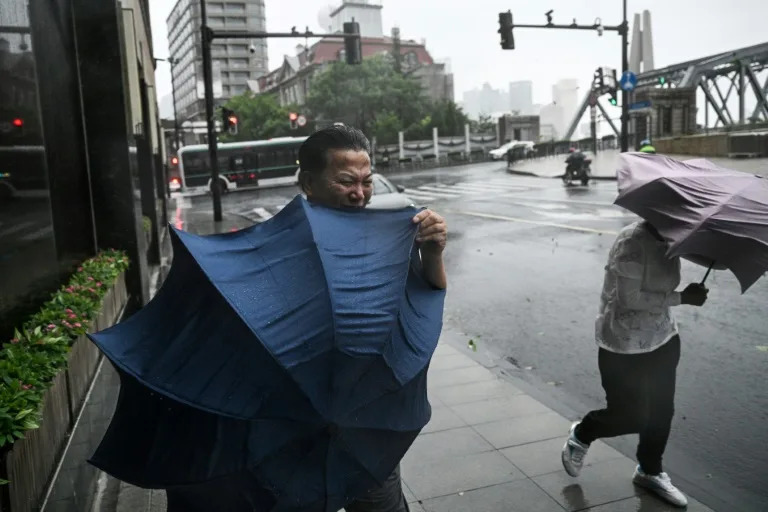Bebinca strongest typhoon to hit Shanghai since 1949
Rebecca BAILEY
Sun, 15 September 2024

Pedestrians struggle with their umbrellas in strong winds and rain from the passage of Typhoon Bebinca in Shanghai on Monday (Hector RETAMAL) (Hector RETAMAL/AFP/AFP)
The strongest storm to hit Shanghai in over 70 years made landfall on Monday, with flights cancelled and highways closed as Typhoon Bebinca lashed the city with strong winds and torrential rains.
A red alert is in place, and some coastal residents have been evacuated, city authorities said.
The typhoon landed early Monday morning in the coastal area of Lingang New City, in Pudong to the city's east, the China Meteorological Administration said.
It is the strongest storm to hit Shanghai since Typhoon Gloria in 1949, state broadcaster CCTV said shortly after Bebinca made landfall.
Many businesses were already closed for the Mid-Autumn Festival public holiday, and the city's 25 million residents have been advised to avoid leaving their homes.
All flights at Shanghai's two main airports are grounded, and ferry services and some trains have been suspended.
Highways were closed at 1:00 am local time (1700 GMT), and a 40 kilometre (25 mile) per hour speed limit is in place on roads inside the city.
At rush hour, live video feeds showed Shanghai's normally jammed roads almost empty of traffic, and its famed skyline obscured by thick fog.
Nine thousand residents have been evacuated from Chongming District, an island at the mouth of the Yangtze River, authorities said.
Footage from northern Baoshan District showed ferocious winds ripping through a line of trees on the riverbank.
Shanghai's flood control headquarters told CCTV they had already received dozens of reports of incidents related to the typhoon, mostly fallen trees and billboards.
CCTV broadcast footage of a reporter by the coast in neighbouring Zhejiang province, where waves pounded the craggy coastline under leaden skies.
"If I step out into (the storm), I can barely speak," the reporter said.
"You can see that the surface of the sea is just wave after wave, each higher than the last."
Another typhoon, Yagi, killed at least four people and injured 95 when it passed through China's southern Hainan island this month, according to national weather authorities.
Bebinca has also passed through Japan and the central and southern Philippines, where falling trees killed six people.
CCTV said Bebinca was expected to move northwest, causing heavy rain and high winds in Jiangsu, Zhejiang and Anhui provinces.
China is the world's biggest emitter of the greenhouse gases that scientists say are driving climate change and making extreme weather more frequent and intense.
mjw-reb/je/smw
Shanghai slammed by what China says is the city’s strongest storm in seven decades
Nectar Gan, CNN
Sun, 15 September 2024
Shanghai was brought to a standstill on Monday by what authorities say was the strongest typhoon to directly hit the Chinese financial hub in more than seven decades, with flights, trains and highways suspended during a national holiday.
Typhoon Bebinca made landfall in an industrial suburb southeast of the metropolis of 25 million people at about 7:30 a.m. local time. The Joint Typhoon Warning Center (JTWC) said it packed top wind speeds of 130 kilometers per hour (80 mph), the equivalent of a Category 1 Atlantic hurricane.
The China Meteorological Administration recorded wind speeds of 151 kph (94 mph) near the typhoon’s eye when it made landfall, and state media described it as the strongest storm to hit Shanghai since 1949.
The administration on Monday issued a red typhoon warning, its most severe alert, warning of gale force winds, heavy rainfall and coastal floods in large swathes of eastern China.
The powerful storm has disrupted travel plans for holidaymakers during the Mid-Autumn festival, or Moon Festival, a three-day national holiday that started on Sunday.
All flights at Shanghai’s two international airports have been canceled since 8 p.m. Sunday. The city also suspended its ferry services, halted some train lines and closed ports, bridges and highways on Monday.
Many tourist destinations in the city, including Shanghai Disney Resort, were also shut on Monday. Videos on Douyin, China’s version of Tiktok, show Disney staff taping trash bins to fences at the park.

A large number of fishing boats moor at a port to avoid Typhoon Bebinca in Zhoushan, China, on September 15, 2024. - Costfoto/NurPhoto/Getty Images
More than 414,000 people in Shanghai had been evacuated to safety by midnight Monday, with exhibition centers and school gyms turned into makeshift shelters, state broadcaster CCTV reported.
Similar safety measures were also adopted in the neighboring provinces of Zhejiang and Jiangsu. Across the region, more than 1,600 flights had been canceled as of Monday afternoon, according to CCTV.
On Chinese social media, some Shanghai residents reported power and water outages on Monday morning. Many had rushed to stock up on food and supplies over the weekend.
The typhoon is expected to quickly weaken into a tropical storm as it moves inland toward the west.
Bebinca is the second major storm to hit China this month, following deadly Super Typhoon Yagi, the world’s second most powerful tropical cyclone so far this year.
Yagi killed four people in the southern province of Hainan after making landfall on September 6 with maximum sustained wind speeds of 230 kph (140 mph), the equivalent of a Category 4 hurricane, before wreaking devastation across parts of Southeast Asia.
Scientists have found that hotter oceans caused by the human-caused climate crisis are leading storms to intensify more rapidly.
Shanghai is generally not in the direct path of strong typhoons, which typically make landfall further south in China. Prior to Bebinca, the city had only been directly hit by two typhoons – in 1949 and 2022 – plus a handful of severe tropical storms, according to data from the China Meteorological Administration.
This story has been updated with additional information.
For more CNN news and newsletters create an account at CNN.com
No comments:
Post a Comment